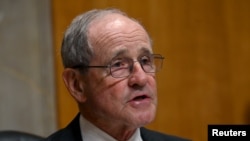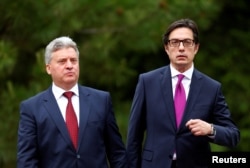This story originated in VOA's Macedonian Service.
WASHINGTON — U.S. lawmakers may vote to approve North Macedonia as the 30th member of NATO as early as next month, according to Senate Foreign Relations Committee Chairman Senator James Risch.
"The process is that we need to have a hearing on it in the Foreign Relations Committee, and I have tentatively scheduled that for approximately two weeks from now," the junior Idaho Republican senator told VOA's Macedonian Service. "Then, as far as when it will be finalized, it goes to the Senate floor, and we would very much like to have that done in June, and we are cautiously optimistic that we can get that done in June."
North Macedonia's long-standing bid to join the military alliance was blocked for more than a decade because of a name dispute with neighboring Greece, which has a province called Macedonia.
North Macedonia, formerly known as Macedonia, changed its name under the Prespa Agreement in June 2018 with Greece, opening the path to NATO and EU membership.
Under the agreement, citizens of North Macedonia are still referred to as Macedonians.
The country's accession protocol was signed by all member states in Brussels on Feb. 6. The accession process continues in the capital of each allied nation, where individual protocols are ratified according to national procedures.
U.S. President Donald Trump, who has praised the country as a "steadfast security partner," submitted its NATO accession protocol to the Senate for ratification on April 30.
North Macedonia's full accession to the alliance would represent a blow to Russia, which opposes NATO expansion and, therefore, the country's accession.
Asked if North Macedonia's NATO membership can reduce Russian influence or political meddling within North Macedonia, he said "that's going to be up to the North Macedonian people themselves."
"But they've already spoken on that," Risch said. "I think the election itself, regarding accession, was a good, clear indication that they don't want that Russian influence, that they don't want that Russian propaganda. So, this taking of what would really be a final step into NATO is a final rejection of Russia and what it stands for and the kind of malign influence they bring."
Last August, members of the Senate Foreign Relations Committee, Wisconsin Republican Senator Ron Johnson and Connecticut Democrat Senator Chris Murphy, sponsored a bipartisan resolution to put the tiny Balkan country on the path to NATO and European Union membership.
Risch also said he anticipates near-unanimous support for North Macedonia's accession protocol when the bill arrives on the Senate floor.





